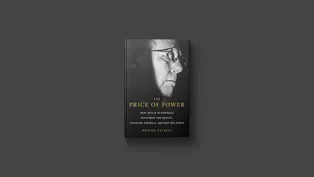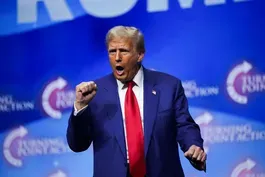
Where Harris and Trump stand on key foreign policy issues
Clip: 10/24/2024 | 7m 47sVideo has Closed Captions
Comparing where Harris and Trump stand on key foreign policy issues
It is among the most consequential decisions presidents can make, when to go to war and how to support America’s partners in their wars. As part of our series looking at the candidates’ policies, Nick Schifrin explores Kamala Harris' and Donald Trump's positions on the wars in Ukraine and the Middle East, and the promises they’ve made on what they would do if elected president.
Problems with Closed Captions? Closed Captioning Feedback
Problems with Closed Captions? Closed Captioning Feedback
Major corporate funding for the PBS News Hour is provided by BDO, BNSF, Consumer Cellular, American Cruise Lines, and Raymond James. Funding for the PBS NewsHour Weekend is provided by...

Where Harris and Trump stand on key foreign policy issues
Clip: 10/24/2024 | 7m 47sVideo has Closed Captions
It is among the most consequential decisions presidents can make, when to go to war and how to support America’s partners in their wars. As part of our series looking at the candidates’ policies, Nick Schifrin explores Kamala Harris' and Donald Trump's positions on the wars in Ukraine and the Middle East, and the promises they’ve made on what they would do if elected president.
Problems with Closed Captions? Closed Captioning Feedback
How to Watch PBS News Hour
PBS News Hour is available to stream on pbs.org and the free PBS App, available on iPhone, Apple TV, Android TV, Android smartphones, Amazon Fire TV, Amazon Fire Tablet, Roku, Samsung Smart TV, and Vizio.
Providing Support for PBS.org
Learn Moreabout PBS online sponsorshipAMNA NAWAZ: It is among the most consequential decisions presidents can make, when to go to war and how to support America's partners in their wars.
As part of our series Promises and Policies, we look at the candidates' policies on the wars in Ukraine and the Middle East and the promises they have made on what they would do if elected president.
For more on that, we turn to Nick Schifrin.
Good to see you, Nick.
NICK SCHIFRIN: Thanks, Amna.
AMNA NAWAZ: Let's start in the Middle East then.
So what are the candidates policies there and specifically on Gaza?
NICK SCHIFRIN: Both candidates express outrage over the October 7 terrorist attacks.
They support Israel's right to defend itself and they promise military support for Israel.
And, interestingly, both criticize the nature of the war in Gaza, but through different lenses and with different solutions.
So, first, let's listen to Harris talking about Gaza in July after meeting with Israel Prime Minister Benjamin Netanyahu.
KAMALA HARRIS, Vice President of the United States (D) and U.S. Presidential Candidate: The images of dead children and desperate, hungry people fleeing for safety, sometimes displaced for the second, third or fourth time, we cannot look away in the face of these tragedies.
We cannot allow ourselves to become numb to the suffering, and I will not be silent.
NICK SCHIFRIN: Now let's listen to former President Trump first speaking to reporters from Israel's Hayom, a conservative outlet, from Israel back in March.
DONALD TRUMP, Former President of the United States (R) and Current U.S. Presidential Candidate: Shots, I mean, moving shots of bombs being dropped into buildings in Gaza.
And I said, ooh, that's a terrible portrait.
It's a very bad picture for the world.
The world is seeing this.
QUESTION: Yes, but Hamas terrorists are in those buildings, so how can we fight them?
DONALD TRUMP: You go and do what you have to do, but you don't do that.
NICK SCHIFRIN: So Trump has kept that implicit criticism consistent, Amna, even wanting to see the war in Gaza and soon, and even after speaking to Netanyahu in August.
DONALD TRUMP: I did encourage him to get this over with.
You want to get it over with.
It has to get over with fast, but have victory, get your victory, and get it over with.
It has to stop.
The killing has to stop.
NICK SCHIFRIN: So when you look at how to get the war to stop, that is where the two candidates differ.
As you just heard, Trump said that Israel has to have victory, although, as far as I can tell, he's never actually described destroying Hamas, which is, of course, how Benjamin Netanyahu describes victory.
Harris, on the other hand, has said the war in Gaza should end with a cease-fire that would release all the hostages and end the war.
AMNA NAWAZ: And we have seen now Mr. Trump has used the Biden/Harris administration's call for a cease-fire as a way to say that he is actually a stronger supporter of Israel, right?
NICK SCHIFRIN: Yes, exactly.
Even though that framework for the cease-fire that President Biden announced is actually Israel's framework for a cease-fire, Trump's used the cease-fire and the administration's pause on 2,000-pound bombs to Israel to portray Biden and Harris as withholding support for Israel.
DONALD TRUMP: From the start, Harris has worked to tie Israel's hands behind its back, demanding an immediate cease-fire.
And I will give Israel the support that it needs to win, but I do want them to win fast.
NICK SCHIFRIN: You see how Trump actually leaves the prompter to add "win fast."
Harris, on the other hand, highlights the administration's unprecedented support for Israel, including helping shoot down Iranian missiles fired at Israel in April and just last week to plane an air defense system with 100 soldiers.
And Harris describes her support for Israel as lifelong.
KAMALA HARRIS: From when I was a young girl collecting funds to plant trees for Israel to my time in the United States Senate and now at the White House, I have had an unwavering commitment to the existence of the state of Israel, to its security, and to the people of Israel.
NICK SCHIFRIN: Harris describes U.S. support for Israel, Amna, through the lens of a decades-old partnership.
Former President Trump describes U.S. support for the state of Israel needing him personally.
AMNA NAWAZ: All right, let's switch now to Russia's war in Ukraine.
Tell us where the candidates stand on both U.S. support for Ukraine and also just the future of the war.
NICK SCHIFRIN: As you know, Vice President Harris and, frankly, much of the foreign policy establishment here in Washington has stood by Ukraine.
Former President Donald Trump promises to end the war even before beginning a second term, and he's questioned the level of U.S. support to Ukraine.
So, first, let's listen to him during last month's ABC debate.
DAVID MUIR, Moderator: Do you want Ukraine to win this war?
DONALD TRUMP: I want the war to stop.
I want to save lives.
It's the U.S.' best interest to get this war finished and just get it done, negotiate a deal, because we have to stop all of these human lives from being destroyed.
NICK SCHIFRIN: Trump has not described how he would accomplish ending the war, but some advisers from the other Trump administrations, from the previous Trump administration wrote a research paper that lays out a few points.
One, Ukraine should negotiate based on the current front lines.
Two, delay Ukraine's NATO membership for at least a decade.
Offer Russia sanctions relief in exchange for giving Ukraine some kind of long-term security architecture.
And here's what Vice President Harris said about those ideas right before she met with Ukrainian President Volodymyr Zelenskyy in September.
KAMALA HARRIS: There are some in my country who would instead force Ukraine to give up large parts of its sovereign territory, who would demand that Ukraine accept neutrality, and would require Ukraine to forego security relationships with other nations.
These proposals are the same of those of Putin.
And let us be clear.
They are not proposals for peace.
Instead, they are proposals for surrender.
NICK SCHIFRIN: But neither Harris nor the Biden administration have described exactly how they will help Ukraine achieve victory.
Ukraine's achievement -- or Ukraine's description of victory requires NATO membership and using U.S. weapons to strike long -- deep into Russia, two items that the Biden administration has actually rejected.
AMNA NAWAZ: So, you mentioned NATO.
If you take a slightly broader lens here, how do both Harris and Trump differ when it comes to NATO and Europe?
NICK SCHIFRIN: Well, very dramatically.
In one of the most notorious foreign policy moments of the campaign, Trump seemed to dismiss Article 5 that commits the U.S. to defending European allies, regardless of whether they spend 2 percent of their GDP on defense.
DONALD TRUMP: Most politicians have said to that, yes, we will protect you under any circumstances.
Well, then they're never paying up.
I said, no, no, you have to understand.
You don't pay your bills.
You get no protection.
It's very simple.
NICK SCHIFRIN: Trump's allies say, don't take him literally, he is continuing a pressure campaign on Europe that they see as successful in order to get Europe to pay or spend more of their money on defense.
But we saw Harris about that, Trump's statement, say this in September: KAMALA HARRIS: Understand why the European allies and our NATO allies are so thankful that you are no longer president and that we understand the importance of the greatest military alliance the world has ever known, which is NATO, and what we have done to preserve the ability of Zelenskyy and the Ukrainians to fight for their independence.
Otherwise, Putin would be sitting in Kyiv with his eyes on the rest of Europe.
NICK SCHIFRIN: Senior European officials I speak to, Amna, are enormously worried about what a second Trump administration would mean.
For their part, Israeli officials tell me they're worried about whether Harris will maintain the level of support for Israel.
Bottom line, of course, it's no surprise the entire world is watching this election, knowing what's at stake.
AMNA NAWAZ: The world is watching.
Nick Schifrin, thank you so much.
NICK SCHIFRIN: Thank you.
Boeing union rejects contract, complicating CEO's plans
Video has Closed Captions
Boeing union rejects offer to end strike, complicating CEO's plan to turn company around (4m 16s)
Harris paints Trump as threat to democracy as election nears
Video has Closed Captions
Harris paints Trump as threat to democracy as Election Day draws closer (3m 56s)
How the racial makeup of colleges has changed
Video has Closed Captions
How the racial makeup of colleges changed after the affirmative action ruling (4m 28s)
States work to cap methane leaks from abandoned wells
Video has Closed Captions
States work to track down and cap dangerous methane leaks from abandoned oil and gas wells (8m 21s)
'The Price of Power' explores McConnell's complex legacy
Video has Closed Captions
New book 'The Price of Power' explores the complex legacy of Mitch McConnell (5m 47s)
Trump's rambling raises questions about mental decline
Video has Closed Captions
Trump's rambling speeches raise questions about mental decline (9m 14s)
Providing Support for PBS.org
Learn Moreabout PBS online sponsorshipSupport for PBS provided by:
Major corporate funding for the PBS News Hour is provided by BDO, BNSF, Consumer Cellular, American Cruise Lines, and Raymond James. Funding for the PBS NewsHour Weekend is provided by...

















